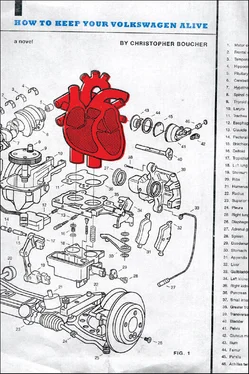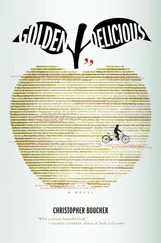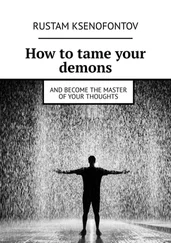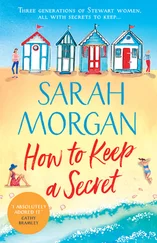LOOK BACK IN ANGER
The Memory of My Father was born at Atkin’s in the clutch of the Tree’s escape. Or, he was born in the days afterwards, in my childhood home in Longmeadow, sprung from our — mine, my brother’s, the Two Sides of My Mothers’—collaged mourning.
Or, he was never born — he’d simply always been there, in my mind, a Memory available for hire and waiting, right off the page, for his moment.
I have to admit: In some ways I’d been preparing for the loss of my father my whole life. I’d expected it to break me and it did — the bile of loss scorched every surface inside me, incinerating some wires and parts completely and forcing others into new places in my body. I changed for good. I’d been a student — the Promise of a Book — and I became nothing: a poor father, a stumbling reporter, a really terrible lover. All the hair moved off my head and my stomach swelled with what I could not get back, with the terrible space of his no-voice, our non-talks, the never-again feeling of connecting with someone, of feeling understood, of being loved. I literally went to a new place in my own mind — drove off from some things and never returned to them. I built an entire world — OK, a county or two, but still — inside myself based on loneliness and bewilderment, on what was not, on the sounds things make when they crack, break, split, shatter, pop.
The Dogs didn’t help things, either. I expected a massive search or news about suspects, but I didn’t hear a bark from them. In the first month or so after the attack, I went to the Amherst CityDog Barracks twice a week and spoke through the window to the Dog on duty.
“Nothing new,” he’d say as soon as I approached the glass.
“Are they still going out?” I’d ask. “Are they looking?”
He’d always tell me they were.
Finally I met with the Captain — sat in the leather chair in his office, looked him in the eye. He leaned over the desk, his paws crossed.
“We go out on tree patrols every day,” the Captain said. “But truthfully, we have no leads on your tree at all.”
“Did you try Montague?” I asked.
“Of course, but—”
“Charlemont?”
“It’s not that simple,” he said.
“Greenfield?”
“Mr. _____ — it’s not that we can’t find Heart-Breed trees. But it’s almost impossible to find one particular tree — not a Memory, mind you, but the tree itself! — if he wants to hide. Hell, this is why we try and get them to register!”
“How hard can it be to find a tree driving a farm?”
“These things survive by hiding, by camouflaging themselves. He could literally be anywhere — alive or dead, right under our nose or a thousand miles away.”
“Isn’t there anything you can do?” I said. “My Dad ’s in that farm.”
The Dog leaned back in his chair and pursed his lips. “Did you read the report? That hard-to-see Truck saw the whole thing.”
I knew what he was implying. “Still,” I said. “He could still be—”
“He’s not,” the Dog said. “Read what the Truck said about your Dad’s chest. ”
It wasn’t too long after that meeting — after the sentence of loss had begun to set itself in my mind and its rhythms became known to me — that I walked out the front door of the Crescent Street apartments, on my way somewhere, and noticed the Memory of My Father — a flickering image of my father at about fifty-five — balancing on some rickety scaffolding, doing something to the shakes or the gutter. I guess my mind had started to accept the version that my father was gone, that he wasn’t ever coming back. At the time, in fact, his Memory wasn’t even a surprise — I think I’d been building him my whole life, and to be honest I’m not even sure that this was the first time I noticed him. We had no formal introduction or conversation about our relationship, not even a hello. The Memory of My Father saw me staring up at his work and he climbed down to talk to me as if we’d seen each other five minutes earlier.
“I can’t save it,” he said. He was dressed in paint-covered jeans that once belonged to me, a too-tight flannel shirt from the Salvation Army and moccasin shoes that likely came from a tag sale. He looked out from behind tinted glasses in brown plastic frames.
“Save what?” I asked.
“The sophet,” he said, looking up at the gutters. “It’s all cracked to shit.”
“Can’t you just replace a section of it?”
He frowned, shook his head. “Whole fucking thing needs to go,” he said.
“Shit,” I said. “We’re talking a good few hours, right?”
He cleared his throat and spit. “At least.”
The more I lived with this Memory, the more I learned about its limitations — what it could and couldn’t do. Sometimes it froze on me, and other times it did nothing but mimic my actions. I’d be powering at my desk, say, and when I picked up a stapler it would reach down and pick up the Memory of a Stapler. I’d type the words “How to Keep Your Volkswagen Alive,” and it’d type “The Memory of How to Keep Your Volkswagen Alive.”
There were also moments, though, when the Memory was a mystery, an evocation from a deep, hidden section of my mind. Not long after I saw him on the scaffolding, for example, I drove the VW home to my parents’ house in Longmeadow and I saw the Memory of My Father again. This time he was painting the house a new color, a color called Fear of Death. Apparently he’d decided to do this without asking anyone (which is just like my father!), not even the Two Sides of My Mother. Not that they would have objected — they spent their days now dressed in black, smoking their fingers in unison and staring out the window, as if by doing so they could change the course of trees and hearts.
The Memory of My Father saw the VW and I pull in and held up his hand. “Give me just a second , I’m almost done,” he said, running his brush against the side of the house, then stepping back. He held out his arms. “What do you think?”
The color was so bright it almost hurt to look at. “It’s not subtle,” I said.
“You don’t like it either? What the fuck! Everyone’s been giving me shit about it.”
“I didn’t say I didn’t like it. It’s just — sort of loud.”
“It’ll fade, it’ll fade!” he said. He was still holding the brush in his hand, and the Fear of Death rushed to the edge of the bristles and threatened to slip off and drop to the pavement.
“Won’t that take years?” I said.
“Not with the weather we’ve been having.”
I knew exactly what he was saying. “The inner weather, you mean?”
He put his hands on his waist. “What?” he said.
Later, the four of us — myself, the Memory of My Father and the Two Sides of My Mother — went out to Bridge’s for pizza. Bridge’s had been one of my parents’ favorite places when my Dad was alive — the pizza there was brief and kind — and it felt good to be back there. And it was just like my father for the Memory of My Father to reach for the tab with his paint-stained hands and pay. This was symbolic, of course, because he didn’t really know time, nor could he make it or lose it. He was, at that moment, my Dad back in the mid-1990s, when my father was renovating the Crescent Street apartments and pouring all that he had into them. My Dad’s hair at the time was wild and gray, his glasses were gold-rimmed and his wallet, when you opened it, had nothing but sand inside.
It was during dinner that night, I think, that I more fully realized how this Memory worked — that it could change according to where I was in my mind, and that it was able to do certain things (work, pay) and not others (hug, sip tea, read or write). The Memory of My Father could say certain words or phrases, but others were hidden from him. Sometimes his image was almost completely transparent and other times it appeared so solid that you might actually think he was a real man.
Читать дальше












